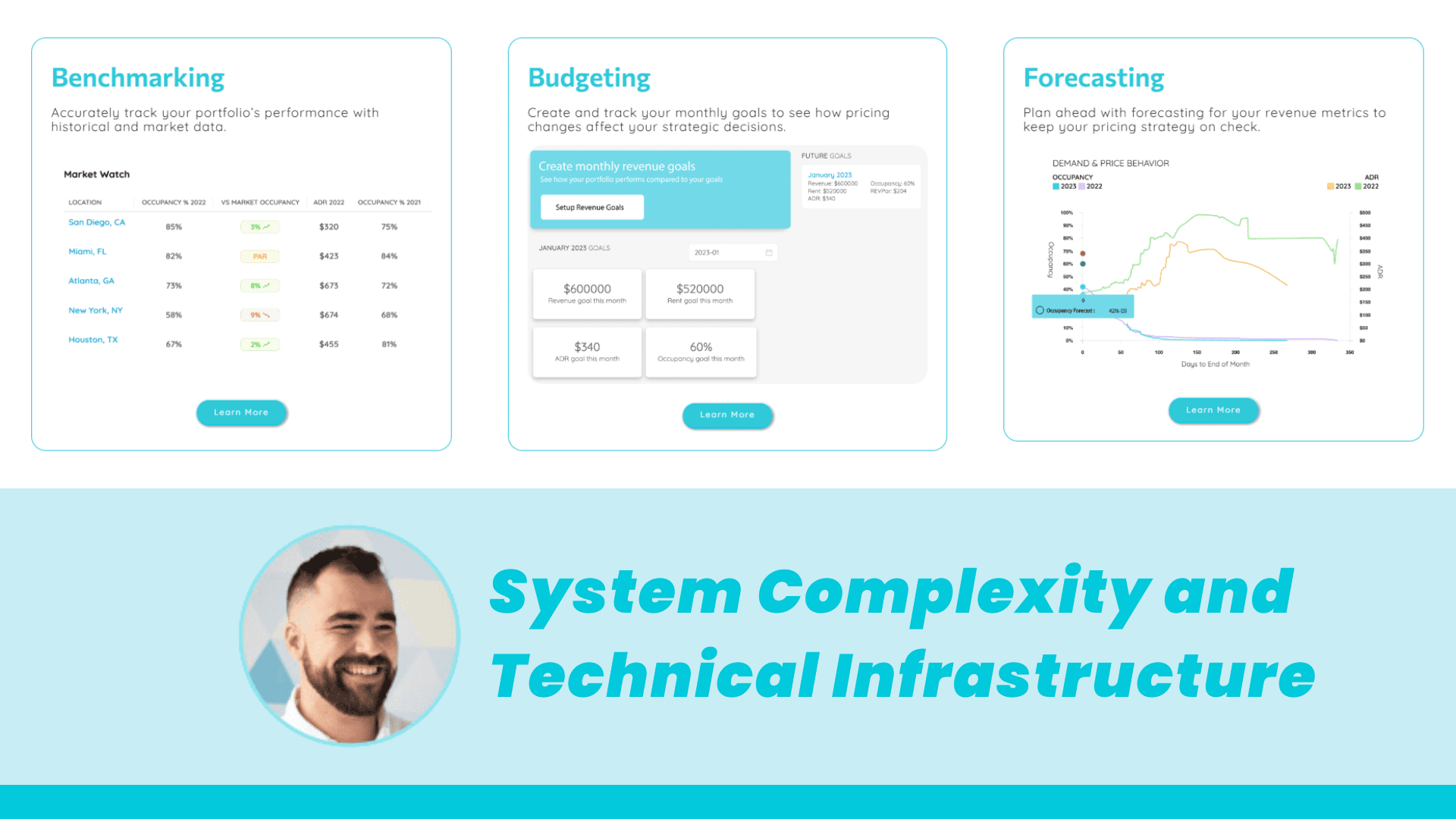In the bustling world of Short-Term Rentals (STR), dynamic pricing has revolutionized revenue optimization by tailoring rates to real-time market dynamics. However, this innovation comes hand-in-hand with challenges surrounding technical infrastructure and system complexity. In this article, we’ll delve into the expertise of Gustavo Rivera Pecunia, Co-Founder and Chief Technology Officer at Quibble.
He delves into the intricacies of developing and maintaining a technical infrastructure to support dynamic pricing in the Short-Term Rental (STR) industry. Gustavo, with his profound expertise in open source technologies, artificial intelligence, and machine learning, sheds light on the strategies employed by Quibble to conquer the challenges posed by system complexity and technical infrastructure in the dynamic pricing landscape.
Unraveling the Key Challenges
When asked about the key challenges faced in the development and maintenance of a technical infrastructure to support dynamic pricing in the STR industry, Gustavo emphasized the formidable task of managing vast amounts of real-time data for accurate pricing decisions. “Scalability and responsiveness are paramount when processing data from diverse sources,” he said. Adapting to the volatile nature of market trends and competitor pricing requires a system that can swiftly adjust pricing algorithms. He highlighted the delicate balance between algorithmic complexity and user-friendly interfaces to ensure a seamless experience for property managers and STR owners.
Gustavo explained that Quibble’s approach to seamless integration involves a multifaceted strategy. Standardized APIs and data exchange protocols play a pivotal role in facilitating effective communication between systems. With a modular integration process, Quibble ensures compatibility with a variety of platforms. Collaborative partnerships enable Quibble to leverage partners’ APIs and SDKs, while rigorous testing and monitoring are conducted to preempt any disruptions to the user experience during integration.

Ensuring Accuracy and Reliability
Addressing concerns about accuracy and reliability in dynamic pricing systems, Gustavo emphasized the significance of rigorous data validation processes. These processes ensure the quality of data prior to its utilization in algorithms. He stressed the importance of ongoing maintenance and performance monitoring, which allows Quibble to identify and rectify anomalies. Gustavo further underscored Quibble’s commitment to refining algorithms through machine learning and AI techniques, enhancing their adaptability to market fluctuations over time.
Future-Proofing for Success
In response to inquiries about future-proofing technical infrastructure, Gustavo elucidated Quibble’s approach. “Flexibility and adaptability are our cornerstones,” he affirmed. The architecture of Quibble’s system is deliberately designed to accommodate emerging data sources, technologies, and shifts in market dynamics. Gustavo emphasized Quibble’s engagement with cutting-edge technologies like cloud computing, edge computing, and distributed systems, which enables the seamless integration of new features while preserving core functionalities.
Security as a Pillar
Gustavo left no room for doubt about the security measures implemented by Quibble. Encryption protocols are employed to safeguard sensitive data during both transmission and storage. Role-based access controls ensure that only authorized personnel can access sensitive information. Regular security audits and adherence to data protection regulations underscore Quibble’s dedication to safeguarding customer data and privacy.
Scaling Infrastructure to New Heights
“Dealing with data volume is a core challenge,” Gustavo acknowledged. Quibble tackles this challenge by leveraging scalable technologies such as cloud-based storage and processing. Horizontal scaling allows Quibble to allocate resources as needed to maintain peak performance. Additionally, data caching and optimization techniques streamline data processing and reduce latency, ensuring that Quibble’s system efficiently manages the demands of STR dynamic pricing.

Keeping the Technical Team Up-to-Date
Gustavo revealed Quibble’s proactive approach to keeping the technical team updated on industry trends and best practices. Participation in conferences, webinars, and training programs is encouraged. Internal knowledge-sharing sessions foster innovation within the team. Gustavo affirmed that allocating time for research and experimentation with emerging technologies is pivotal to Quibble’s drive for continuous improvement. Collaborations with external experts and technology partners ensure that Quibble remains at the forefront of dynamic pricing technology.
💎 Conclusion
Overcoming system complexity and technical infrastructure challenges in STR dynamic pricing requires a blend of innovation, adaptability, and dedication to ensuring accuracy and reliability. Gustavo’s insights provide a captivating glimpse into Quibble’s dedication to conquering the complexities of system architecture and technical infrastructure in the realm of STR dynamic pricing. With a focus on innovation, adaptability, security, and staying updated with industry trends, Quibble stands as a pioneer in delivering cutting-edge solutions to the STR industry. To explore how Quibble’s dynamic pricing solutions can transform your STR business, visit Quibble’s official website today.










